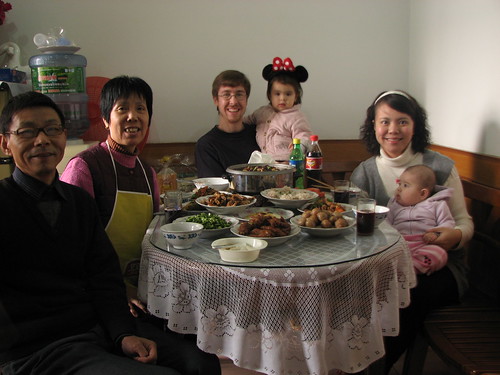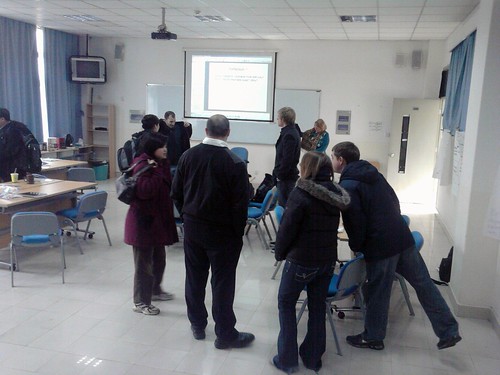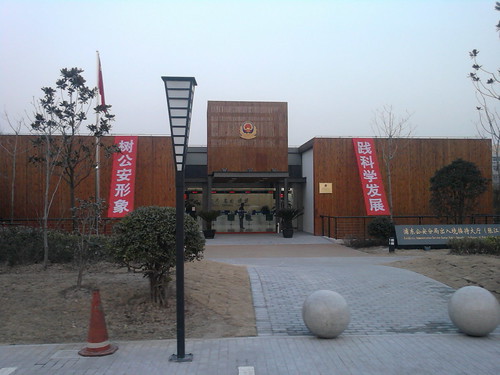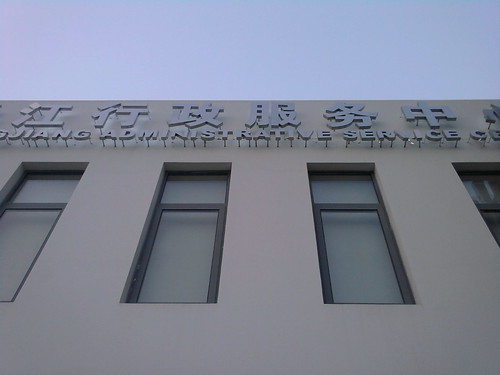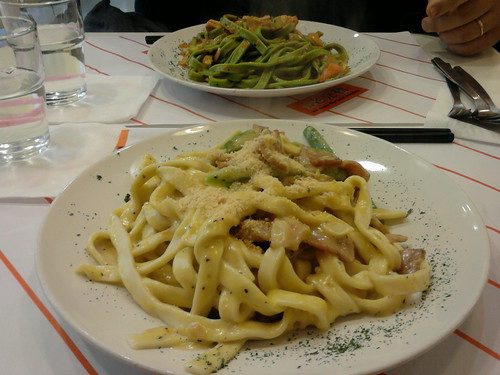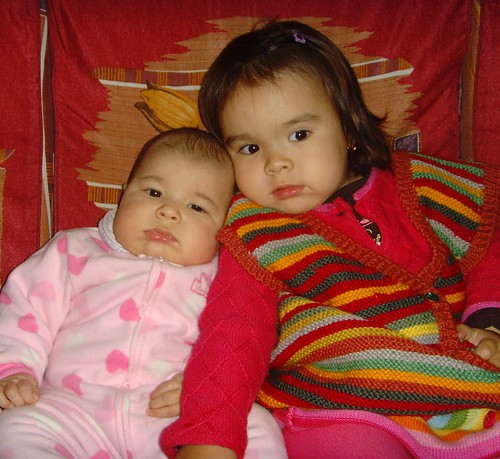Micah Sittig
你是互联网,我是防火墙
Tuesday, January 27, 2009
Friday, January 23, 2009
According to an article in today's Xinmin Evening Post, the Waibaidu/Garden Bridge at the north end of the Bund will be back in place by the end of February. The bridge was removed and taken to Pudong for repairs a few months ago.
Wednesday, January 21, 2009
We will restore science to its rightful place, and wield technology's wonders to raise health care's quality and lower its cost. We will harness the sun and the winds and the soil to fuel our cars and run our factories. And we will transform our schools and colleges and universities to meet the demands of a new age. All this we can do. And all this we will do.
Sunday, January 18, 2009
A list of evidences for a definition of good teaching:
1) Whenever students are involved with issues they regard as vital concerns, good teaching is going on.
2) Whenever students are involved with explanations of human differences, good teaching is going on.
3) Whenever students are being helped to see major concepts, big ideas, and general principles, and are not merely engaged in the pursuit of isolated facts, good teaching is going on.
4) Whenever students are involved in planning what they will be doing, it is likely that good teaching is going on.
5) Whenever students are involved with applying ideals such as fairness, equity or justice to their world, it is likely that good teaching is going on.
6) Whenever students are actively involved, it is likely that good teaching is going on. 7) Whenever students are directly involved in real-life experience, it is likely that good teaching is going on.
8) Whenever students are actively involved in heterogeneous groups it is likely that good teaching is going on.
9) Whenever students are asked to think about an idea in a way that questions common sense or a widely accepted assumption that relates new ideas to ones learned previously, or that applies an idea to the problems of living, then there is a chance that good teaching is going on.
10) Whenever students are involved in re-doing, polishing or perfecting their work, it is likely that good teaching is going on.
11) Whenever teachers involve students with the technology of information access, good teaching is going on.
12) Whenever students are involved in reflecting on their own lives and how they have come to believe and feel as they do good teaching is going on.
Haberman, Martin. "The Pedagogy of Poverty Versus Good Teaching". Phi Delta Kappan, 73(4), 290-294.
An answer that my MEd class hasn't been able to give me yet, and an affirmation of the teaching methods I aim for:
I believe that one of the greatest difficulties in the present teaching of science is that the material is presented in purely objective form, or is treated as a new peculiar kind of experience which the child can add to that which he has already had. In reality, science is of value because it gives the ability to interpret and control the experience already had. It should be introduced, not as so much new subject-matter, but as showing the factors already involved in previous experience and as furnishing tools by which that experience can be more easily and effectively regulated.
Dewey, John (1897) 'My pedagogic creed', The School Journal, Volume LIV, Number 3 (January 16, 1897), pages 77-80.
Saturday, January 17, 2009
 Dinner: pork chops in cream sauce, mushroom rice, broccoli, and garden salad with homemade croutons.
Dinner: pork chops in cream sauce, mushroom rice, broccoli, and garden salad with homemade croutons.
We're done with the first class session of the MEd program! The class was a bit tamer than I thought; the prof is taking a roundabout route to teaching actual content, focusing on self-examination and reflection to study the qualities of an excellent teacher. There was a miscommunication that meant we didn't get the class syllabus until today, which means we have a bunch of papers to write that should have been written before the class started. The books we were assigned come from one specific school of thought on teacher education, which was developed in a very different place and time than the one in which we are teaching. Luckily I've been able to do some Googling around and found extra material from competing theories that should be a better fit for our school's situation and my own vision of teaching.Tomorrow is another full-day of class, 8:30-5:30. Wish me luck.
Friday, January 16, 2009
Random notes from the last day of the semester:
- I took the science department out for lunch to Jepson Life, and overheard many positive reviews of the place. The fourth floor is even more spectacular than the third; can't wait for spring to eat out on the deck under the evening sky. A photo of my roasted vegetable pizza 烤蔬菜比萨 graces this post.
- I think my RSS feeds follow my lifestyle, and recently I've noticed that my "China weblogs" folders are thinning, and I'm subscribing to more international school teacher weblogs and bicultural family weblogs. Though I'm a bit conflicted on that last one; I think it's still enough to be a good family, and you'll be able to deal with almost anything by just being loving and supporting and creating your own family culture. I'm still thinking about that, though. (Jennifer: I wrote you a long e-mail reply, but it was too and I've been too busy to edit it.) One community that I don't want to lose touch with is the Chinese internet free thought group, and another community I'd like to get more involved in (as a bridge blogger?) is the Chinese education reform/tech community. Would need to renew my Chinese study habits to really be effective, though.
- I went to the company main campus to hand in some documents for my work permit renewal (my school's teachers are not "foreign experts"; long story), and I walked home to save taxi fare. I took some pictures below, including one of the new Border Control service center that just opened up a few weeks ago across from SMIC. I'd be more excited about it but now that I'm gainfully employed the company HR takes care of all that paperwork. Nice building, though, and very friendly staff.
- I really miss Jodi, Charlotte and Maryann. Luckily I think this MEd class will help the time to pass faster. Eight days till I fly back to meet them.
Sunday, January 11, 2009
My phone call with Nongfu Shanquan just how:
NONGFU: Hello?
MICAH: Is this Nongfu Shanquan?
NO: Yeah. <silence>
MI: I'd like to order one bottle of water.
NO: One barrel?
MI: Ye...
NO: (interrupting) OK, got it. <click>
They are efficient. For lunch this afternoon I met up with John (B) at People's Square. First we stopped by Jiajia Tangbao for a steamer full of Shanghai's (debatably) best soup dumplings. Once again, they were out of all kinds except crab+pork and all-crab dumplings. Can somebody confirm that the other kinds do actually exist? After that we hopped down a couple storefronts to Laokele (老克勒), our first time there for the noodles. It was fabulous: John got the spinach noodles, and I had the asparagus bacon alfredo on carrot noodles, rich and oily and absolutely delicious. By the time lunch was over I had so much fat in my stomach I felt like I was done eating for a few days. John and I chatted about kids, my work his school, his new job at CIC, and weird stuff like dietary restrictions as law, and real estate around the city (imagine that, people in Shanghai discussing house prices?!). It was a good lunch, we should meet up again after the CNY.
Thanks, Heat Wolves.
Friday, January 09, 2009
From Zhangjiang BBS:
黑车的报价如下:
早晨3元,有雪,暴雨,车少,抓车5元。特殊时期,10元
晚上2元,暴雨,车少,抓车3元。有雪,特殊时期5元
愿坐就坐,不坐就算。
Illegal taxi-van fares are as follows:
Morning is RMB 3; snowy, rainy days with few vans are RMB 5; special occasions RMB 10.
Evening is RMB 2; snowy, rainy days with few vans are RMB 3; special occasions RMB 5.
If you willing then take them, if not then just forget about it.
I've found that late at night when the buses stop running, the morning rates kick in again.
Thursday, January 08, 2009
 Photo of Shanghai schoolchildren by alokemon on Flickr.
Photo of Shanghai schoolchildren by alokemon on Flickr.
(I said I'd post the first part of my e-mail about getting your kids educated here in Shanghai, so here it is. In this essay I tried to avoid singling out any specific schools because my opinions are still very subjective, but if you want meet up or chat privately by e-mail I'd be happy to put the smack-down on specific schools!)
I'm not an expert on the topic but I do have two small investments (Charlotte and Maryann) and work at SMIC so, as you predicted, I have thought about it before.
THE DECISION
The way I see it, choosing a school is a decision with personal/practical, long-term/short-term trade-offs. Good questions to ask are: where do we live/work and what's in the area? where will our family be in 10 years? what can/will we be able to afford financially? what do I want my child to learn? what do I want my child's options to be when he graduates/transfers out?
THE OPTIONS
Your answers to these questions will help you to narrow down from the options available to you in Shanghai, which are are: local schools, international schools, and the in-betweens. In my judgement, the international schools range from bad-soso-good-excellent, local schools follow the same scale, and in-betweens (local private schools with international sections) are generally bad with only a few exceptions (my school being one of the exceptions, and still not great; more below).
Then you have to choose a specific school. While different schools suit different people (the "personal" part of the decision), there are some common standards on which you might rate a school: teacher quality and turnover, curriculum, facilities and resources, administration, communication with parents, cafeteria food quality, etc. No matter the judgement you make, though, you will hear some indignant parents say "well I say! my child *loves* it at Ho-Hum Kindergarden! they may not have XXX, but their YYY is so good". Reasons for choosing one school that may be genuinely important to one parent can be genuine rubbish to another, and you may find yourself one both sides of the divide at some point or another. So take any opinions you get with a grain of salt and stand up for what is important to you and your child.
English-speaking international schools have the advantage of giving your kid a non-Chinese education and being on track with school systems back in their affiliated home countries, so the transition back can be easier than from a local school. The best international schools provide the highest quality English-language education your kids can get in Shanghai: they are often accredited by well-established national and international educational organizations, they have many experienced teachers (high turnover, but still), and their facilities can be top-notch. The worst international schools in Shanghai are poorly-run, hire inexperienced teachers, and can only provide a low-quality education equivalent to a bad public school back home. Some international school provide not just a "back home" education, but also the "back home" social environment for parents that want it. Concordia and SAS are geared towards parents and students that want a more pure American experience; Yew Cheung (HK) and Shanghai United (UK) have a greater emphasis on bilingual education and Chinese (but not necessary local) culture. These schools are relatively expensive, nearing 30k US per year all-in; Shanghai United is an exception. Some are better than others, so visits are important before making a final decision.
Chinese schools would give your kid the Chinese experience, but the higher up you go in grade level the harder it will be on your kid to transition back to your own country's school system or to an international school; your kids will also be trained in a Chinese way of thinking, for better or for worse (or for better). Within the local school category, you still have different kinds to choose from. Neighborhood schools tend to be soso in quality, but are easy to get into: just pay the bill (high for foreigners, maybe 60%-70% more). The best local schools are the ones run by or attached to the more prestigious universities, with quality falling the farther they are from the mother school. More selective local schools require an admissions test and/or interview so it's good to be in contact with them ASAP to know their requirements and testing dates. Getting in contact before your child is born is even not too early for preschools; and some preschool are feeder schools for some better elementary schools, which are feeders for some better middle schools, etc, so it's good to have a finger on those paths from the beginning if that's important to you. Private Chinese schools can provide a more progressive education, but from searching through many Chinese school websites I get the impression that you won't find a "progressive American-style education in Chinese" by turning to private Chinese schools; they are still Chinese at the core (reminder: this can be good or bad, depending on what you want).
In-between schools are the private/public Chinese schools that open international divisions. They (should) have college counselors to help the kids apply to universities abroad. By virtue(?) of being attached to Chinese schools, they 1) are regulated by the Shanghai Bureau of Education and follow a Chinese school calendar, and 2) tend advertise heavily the fact that they run a bilingual program (many parents are attracted by this), not because the program is any good but because of inertia and because they have a hard time finding/affording enough native-English-speaking teachers to staff all of their positions. These schools tend to have a high population of Korean students because the schools have lower entrance standards than official international schools. If you can't tell already, I don't have a high opinion of these schools because I get the feeling that a lot of them are just tacked onto Chinese schools as a reputation-and-money-building scheme, though I have heard of parents who are satisfied with them. In my opinion, you're better off sending your kid to a high quality pure-Chinese local school and giving them extra English homework, speaking English at home, letting them watch US TV, etc.
SMIC (my school) is an exception to the in-between school pattern because we have a unique dual-track system, and so is Shanghai High School Int'l Division due to its long history. Still, we try our best but will never measure up to the top international schools because the Bureau of Education caps our tuition rates, which limits our financial resources (I'm not complaining, just being open about the facts. I'm pretty satisfied at SMIC for many reasons, which I'd be happy to share with you).
RESOURCES
As far as printed material, I know of one book on the topic of Shanghai international schools. My school library has a copy and I will send you the author/publisher contact info later this week. As for word of mouth, the best resource that I know of is currently the Shanghai Mamas e-mail list on Yahoo. Its a very diverse crowd and very active, maybe 10-20 e-mails a day, and mostly mothers of younger children so preschools are their specialty. Their archives are searchable when you join their Yahoo Group. You might think that the ShanghaiExpat forums are a good place to ask, but even though I monitor it and answer questions there myself, I find it hit-and-miss depending on who is around that day and what schools they are familiar with. For more professional opinions, relocation companies are usually familiar with the options but I can't recommend any one in particular and I imagine it will cost $$. As far as local public/private schools, I don't know of any print resources on local schools. I think most locals get recommendations through their social circles. I'd do some BBS research (for us that's Liba/篱笆 and Zhangjiang Jiayuan/张江家园) and ask neighbors, friends, etc.
Tuesday, January 06, 2009
I'll never forget what 淫荡 means nor how to pronounce it, thanks to this hilarious joke:
一天上午我到一家外商公司聯絡業務完畢,乘電梯下樓。
在某一層電梯停住了,門打開,看見一個衣著性感的女郎,一手挽著名牌手袋,一手扶著電梯門,身體斜靠著,用挑逗的語氣問我:夠淫蕩嗎?
我控制住洶湧的思潮冷靜分析,人家外商公司就是不同,人家外商企業的女職員就是開放,怪不得有人說,我們比他們落後起碼三十年,這句話是有道理的。
我平靜地說:淫蕩是淫蕩了點,但我喜歡!!
我知道我說這句話的樣子也一定很酷,作一個有骨氣的受傳統文化薰陶男子漢,要在新時代新潮流面前努力轉變思想,不能甘於落後。
突然間那女郎用手袋猛地向我砸來,一邊還說:你這變態!.....
直到晚上我才醒悟, 原來她說的是:
Going Down 嗎?(下樓嗎?)英文真的要苦唸一下喔!!!哈哈!
(Via Zhangjiang BBS.)
Saturday, January 03, 2009
Thought for the day: How do you raise a child in middle-class comfort if all the inspiring stories of greatness start with a person living in adversity?
Possibilities:
- The stories are wrong. Greatness is not bred by adversity.
- Raise the child to choose adversity. (Then why am I not choosing it?)
- Greatness is not great.
- Other.
- A combination of the above.
Continue thinking.
(I just sent a humongous e-mail to an online friend about choosing schools here in Shanghai. It's a shame to let it go to waste, so I'm going to put it on the weblog in chunks. First, the final section on how Jodi and I are going about "planning", as best we can, Charlotte and Maryann's education.)
Here's the decision process that Jodi and I are going through, maybe it will help. We have a baby (Maryann) and a toddler (Charlotte), no plans for more. We plan to be in Shanghai at least through middle school for Charlotte. We're not rich, we save a little, and our current savings are going towards an MEd program for me and another BA for Jodi, so we need something we can work into our month-to-month budget, at least in the short term. I would like our girls to have the option of going to college in the US when they graduate. Jodi and I are both teachers by profession, so we know the importance of a good teacher, but also plan to emphasize education over schooling (I anticipate friction with school administrators over that one, but oh well) so the quality of the school at the lower grades is not the highest priority for us. We live in Zhangjiang High-Tech Park in Pudong, but would like to move to Puxi ASAP (see "education over schooling"), budget-permitting. For both of us, it's a very high priority that our girls be not just bilingual but bi-literate/bi-social in Chinese and English, that they grow up to respect themselves and respect others, and that they be comfortable with their own identities. The last one is super-important, though I've found that mixed kids are usually pretty cool about it.
So... the current plan is to send them to the best local preschool within our budget, maybe even Jodi's own preschool when she starts working again in 2010 (Charlotte=3, Maryann=2); then send them to a good local elementary school, which means visiting Zhangjiang Experimental and a couple others, if we still live in Zhangjiang at that point. When Charlotte nears middle school, the current plan is to switch to whatever int'l school I'm working at, though that depends on what Charlotte and Maryann want, where we live, how their Chinese is, what schools are available, etc. By high school, we do plan to send them to an international school. I am also keeping in mind public/private Chinese schools that have a track record of sending graduate overseas though, because if money is still an issue at that point we may be able to get a better value for our buck at, say, the Fudan High School or Xiwai Foreign Language School, or Yali School in Changsha. (This process somewhat mirrors my own education; my parents were missionaries in Spain when I was young, sent me to public school through middle school, switched to an int'l school in 8th grade, then came back to the US for 10th grade.)
Thursday, January 01, 2009
I had a long New Year's Eve, but it was a good start to the year.
At school, I stayed late working on documentation for the Observatory. Home by 6:15, out the door by 6:30. Zhangjiang Loop Line, Line 2, Line 1 to Hengshan Rd, and I arrived at a hot pot place on Zhaojiabing Rd almost at 8, late by about 45 minutes. Still, only Rebecca and Isaac were there and they welcomed me warmly. We chatted for a while and ate, and then Bruce and Popoever came in a bit later and joined the conversation. Was a good night of very interesting people touching on a range of internet-related topics, from the serious to the ╔囧╗ ╚囧╗ ╚囧╝ ╔囧╝.
At about 10:30 we split ways and I walked back to Hengshan Rd through throng of trendy young Shanghainese. I spotted Lindi the minute I walked into Melting Pot, and she ushered me over to entertain and translate for her husband's visiting cousin. After Cold Fairyland's set, stepping outside to message Jodi at midnight, and meetings a few new friends, a group of us caught a taxi to Bifengtang on Zhaojiabang Rd for "midnight" snacks. It was 3am, and there was still a line for tables!
Afterwards we went to Lindi's place and I napped on the floor because I'd been awake for almost 24 hours by then. Shared a taxi to Longyang Rd at 6am, and I caught the first Dongchuan Line back to Zhangjiang to sleep until noon. I miss Jodi, Charlotte and Maryann on my first day of 2009 but look forward to being back together on the 初一, the first day of the Chinese New Year.
About Me

- Name: Micah Sittig
- Location: Zhangjiang High-Tech Park, Shanghai, China
Archives
- 11/01/2002 - 12/01/2002
- 12/01/2002 - 01/01/2003
- 01/01/2003 - 02/01/2003
- 02/01/2003 - 03/01/2003
- 03/01/2003 - 04/01/2003
- 04/01/2003 - 05/01/2003
- 05/01/2003 - 06/01/2003
- 06/01/2003 - 07/01/2003
- 07/01/2003 - 08/01/2003
- 08/01/2003 - 09/01/2003
- 09/01/2003 - 10/01/2003
- 10/01/2003 - 11/01/2003
- 11/01/2003 - 12/01/2003
- 12/01/2003 - 01/01/2004
- 01/01/2004 - 02/01/2004
- 02/01/2004 - 03/01/2004
- 03/01/2004 - 04/01/2004
- 04/01/2004 - 05/01/2004
- 05/01/2004 - 06/01/2004
- 06/01/2004 - 07/01/2004
- 07/01/2004 - 08/01/2004
- 08/01/2004 - 09/01/2004
- 09/01/2004 - 10/01/2004
- 10/01/2004 - 11/01/2004
- 11/01/2004 - 12/01/2004
- 12/01/2004 - 01/01/2005
- 01/01/2005 - 02/01/2005
- 02/01/2005 - 03/01/2005
- 03/01/2005 - 04/01/2005
- 04/01/2005 - 05/01/2005
- 05/01/2005 - 06/01/2005
- 06/01/2005 - 07/01/2005
- 07/01/2005 - 08/01/2005
- 08/01/2005 - 09/01/2005
- 09/01/2005 - 10/01/2005
- 10/01/2005 - 11/01/2005
- 11/01/2005 - 12/01/2005
- 12/01/2005 - 01/01/2006
- 01/01/2006 - 02/01/2006
- 02/01/2006 - 03/01/2006
- 03/01/2006 - 04/01/2006
- 04/01/2006 - 05/01/2006
- 05/01/2006 - 06/01/2006
- 06/01/2006 - 07/01/2006
- 07/01/2006 - 08/01/2006
- 08/01/2006 - 09/01/2006
- 09/01/2006 - 10/01/2006
- 10/01/2006 - 11/01/2006
- 11/01/2006 - 12/01/2006
- 12/01/2006 - 01/01/2007
- 01/01/2007 - 02/01/2007
- 02/01/2007 - 03/01/2007
- 03/01/2007 - 04/01/2007
- 04/01/2007 - 05/01/2007
- 05/01/2007 - 06/01/2007
- 06/01/2007 - 07/01/2007
- 07/01/2007 - 08/01/2007
- 08/01/2007 - 09/01/2007
- 09/01/2007 - 10/01/2007
- 10/01/2007 - 11/01/2007
- 11/01/2007 - 12/01/2007
- 12/01/2007 - 01/01/2008
- 01/01/2008 - 02/01/2008
- 02/01/2008 - 03/01/2008
- 03/01/2008 - 04/01/2008
- 04/01/2008 - 05/01/2008
- 05/01/2008 - 06/01/2008
- 06/01/2008 - 07/01/2008
- 07/01/2008 - 08/01/2008
- 08/01/2008 - 09/01/2008
- 09/01/2008 - 10/01/2008
- 10/01/2008 - 11/01/2008
- 11/01/2008 - 12/01/2008
- 12/01/2008 - 01/01/2009
- 01/01/2009 - 02/01/2009
- 02/01/2009 - 03/01/2009
- 03/01/2009 - 04/01/2009
- 04/01/2009 - 05/01/2009
- 05/01/2009 - 06/01/2009
- 06/01/2009 - 07/01/2009
- 07/01/2009 - 08/01/2009
- 08/01/2009 - 09/01/2009
- 09/01/2009 - 10/01/2009
- 10/01/2009 - 11/01/2009
- 11/01/2009 - 12/01/2009
- 12/01/2009 - 01/01/2010
- 01/01/2010 - 02/01/2010
- 02/01/2010 - 03/01/2010
- 03/01/2010 - 04/01/2010
- 05/01/2010 - 06/01/2010
- 06/01/2010 - 07/01/2010
- 09/01/2010 - 10/01/2010
- Current Posts
